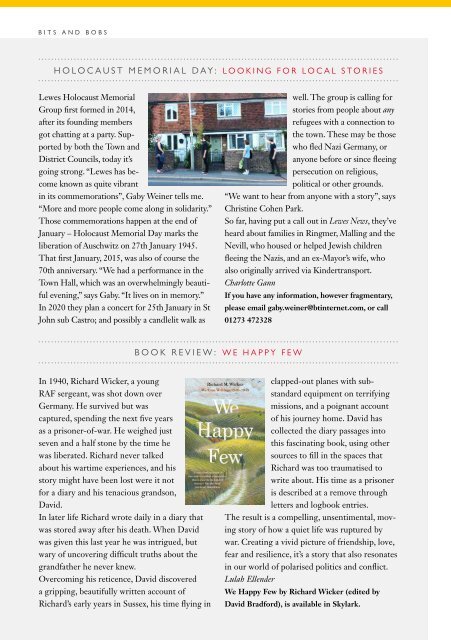Viva Lewes Issue #157 October 2019
You also want an ePaper? Increase the reach of your titles
YUMPU automatically turns print PDFs into web optimized ePapers that Google loves.
BITS AND BOBS<br />
HOLOCAUST MEMORIAL DAY: LOOKING FOR LOCAL STORIES<br />
<strong>Lewes</strong> Holocaust Memorial<br />
Group first formed in 2014,<br />
after its founding members<br />
got chatting at a party. Supported<br />
by both the Town and<br />
District Councils, today it’s<br />
going strong. “<strong>Lewes</strong> has become<br />
known as quite vibrant<br />
in its commemorations”, Gaby Weiner tells me.<br />
“More and more people come along in solidarity.”<br />
Those commemorations happen at the end of<br />
January – Holocaust Memorial Day marks the<br />
liberation of Auschwitz on 27th January 1945.<br />
That first January, 2015, was also of course the<br />
70th anniversary. “We had a performance in the<br />
Town Hall, which was an overwhelmingly beautiful<br />
evening,” says Gaby. “It lives on in memory.”<br />
In 2020 they plan a concert for 25th January in St<br />
John sub Castro; and possibly a candlelit walk as<br />
well. The group is calling for<br />
stories from people about any<br />
refugees with a connection to<br />
the town. These may be those<br />
who fled Nazi Germany, or<br />
anyone before or since fleeing<br />
persecution on religious,<br />
political or other grounds.<br />
“We want to hear from anyone with a story”, says<br />
Christine Cohen Park.<br />
So far, having put a call out in <strong>Lewes</strong> News, they’ve<br />
heard about families in Ringmer, Malling and the<br />
Nevill, who housed or helped Jewish children<br />
fleeing the Nazis, and an ex-Mayor’s wife, who<br />
also originally arrived via Kindertransport.<br />
Charlotte Gann<br />
If you have any information, however fragmentary,<br />
please email gaby.weiner@btinternet.com, or call<br />
01273 472328<br />
BOOK REVIEW: WE HAPPY FEW<br />
In 1940, Richard Wicker, a young<br />
RAF sergeant, was shot down over<br />
Germany. He survived but was<br />
captured, spending the next five years<br />
as a prisoner-of-war. He weighed just<br />
seven and a half stone by the time he<br />
was liberated. Richard never talked<br />
about his wartime experiences, and his<br />
story might have been lost were it not<br />
for a diary and his tenacious grandson,<br />
David.<br />
In later life Richard wrote daily in a diary that<br />
was stored away after his death. When David<br />
was given this last year he was intrigued, but<br />
wary of uncovering difficult truths about the<br />
grandfather he never knew.<br />
Overcoming his reticence, David discovered<br />
a gripping, beautifully written account of<br />
Richard’s early years in Sussex, his time flying in<br />
clapped-out planes with substandard<br />
equipment on terrifying<br />
missions, and a poignant account<br />
of his journey home. David has<br />
collected the diary passages into<br />
this fascinating book, using other<br />
sources to fill in the spaces that<br />
Richard was too traumatised to<br />
write about. His time as a prisoner<br />
is described at a remove through<br />
letters and logbook entries.<br />
The result is a compelling, unsentimental, moving<br />
story of how a quiet life was ruptured by<br />
war. Creating a vivid picture of friendship, love,<br />
fear and resilience, it’s a story that also resonates<br />
in our world of polarised politics and conflict.<br />
Lulah Ellender<br />
We Happy Few by Richard Wicker (edited by<br />
David Bradford), is available in Skylark.

















